*) Günther Rabl
born 1953, Linz
His life in stages, which is similarly reflected in the film:
*) Free Music
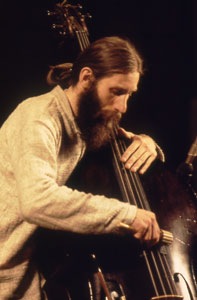 At age 16 he started learning upright bass and quickly found his way into the free jazz scene. At the beginning he played in his hometown Linz, later on in Vienna. He has remained true to improvisation ever since. Amongst others he played with Leszek Zadlo and Friedrich Gulda. Free music means free of prescribed scores.
At age 16 he started learning upright bass and quickly found his way into the free jazz scene. At the beginning he played in his hometown Linz, later on in Vienna. He has remained true to improvisation ever since. Amongst others he played with Leszek Zadlo and Friedrich Gulda. Free music means free of prescribed scores.
He recorded all his concerts on tape and experimented with overdubbing and tape recorders while playing back the tapes.
1974 he discovered electroacoustic and experimental music at the University of Music and Performing Arts as a major.
image description: Günther Rabl at contrabass
photograph: Renate Porstendorfer
*) His own Studio
1976 Rabl moved from Vienna to the countryside. He bought a rundown castle in Neupölla, which offered lots of space for his first studio. For now €300 he acquired old tape recorders from a catholic institution.
In Neupölla he accomplished one of his most important works 'Mugl entsteigt I' [Mugl arises I].
*) Trip to Paris
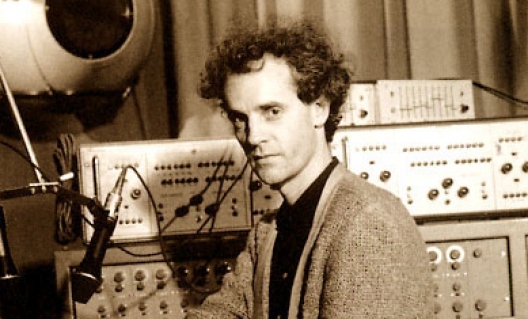 In 1977 Rabl travelled to Paris with a letter from Dieter Kaufmann in his pocket. It was a letter of recommendation that was addressed to Kaufmann’s former teacher François Bayle. After reading the letter and listening to Rabl’s 20 minutes piece 'Mugl entsteigt I', his piece premiered at the festival of tape music at the Recamier Theatre in Paris. Overnight Günther Rabl turned famous in France – in Austria hardly anything was noticed.
In 1977 Rabl travelled to Paris with a letter from Dieter Kaufmann in his pocket. It was a letter of recommendation that was addressed to Kaufmann’s former teacher François Bayle. After reading the letter and listening to Rabl’s 20 minutes piece 'Mugl entsteigt I', his piece premiered at the festival of tape music at the Recamier Theatre in Paris. Overnight Günther Rabl turned famous in France – in Austria hardly anything was noticed.
image description: Francios Bayle, pioneer of acousmatic
source: www.sonore-visuel.fr
Jacques Lonchampt reviewed the following in 'Le Monde' after the premiere:
'One always talks about the infinity of sounds in the electro acoustic universe. However, composers rarely are able to free themselves from common methods and concepts of sound, especially leaving a personal mark on this universe. Only one piece showed real originality: 'Mugl Entsteigt' from the Austrian Günther Rabl. A tape that has been realized with own materials, and that, maybe because of the new sounds, awakens the ear: lines over vibrant patterns, clusters of silvery sounds, and organ of sorts made of smooth forms, a colourful Ostinato of opulent structure. It combines humour and vividness in an attempt of a symphonic development, rarely accomplished among electroacoustic musicians.'
As a result of this review Rabl became known to the ministry and was awarded a government scholarship in 1979.
*) Trio with Gulda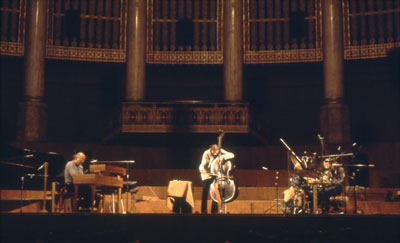
Between 1978 and 1980 Rabl was touring with Friedrich Gulda and Ursula Anders. He was playing freestyle bass (improvisation), performing in Austria and Germany.
After that he dedicated himself increasingly to tape music. He later composed the piece 'Landschaft mit Pianist' [landscape with a pianist] with Friedrich Gilda, which he finished in 1986 in Allentsgschwendt.
image description: Friedrich Gulda, Günther Rabl, Ursula Anders
photograph: Renate Porstendorfer
*) Own Concerts & Festivals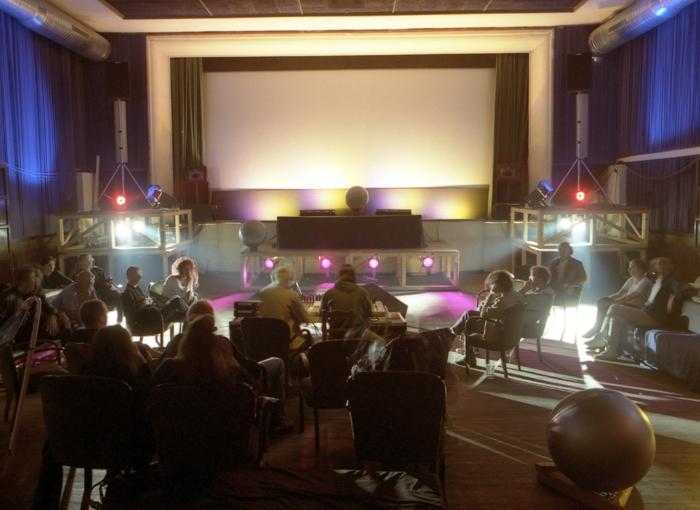
Since the 80ies he mounted own concerts and festivals performing pieces like 'Atem' [breath], 'Trio' [trio] and 'Nebengeräusche' [ambient noise] in Austria.
In 1988, 1989 and 1996 he organized an international festival for tape composition under the name 'Absolute Musik' [absolute music]. In 1992 the festival also took place in Linz, where not only Rabl’s works were performed but also pieces of François Bayle, Frank Zappa and Dieter Feichtner.
image description: Festival 'Absolute Musik' 1996 at Allentsteig
photograph: Renate Porstendorfer
*) On Tour with Mixed Media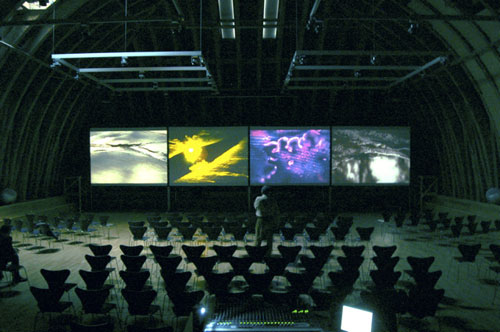
Rabl was increasingly played on the radio and started touring with 'Mixed Media'. Between 1983 and 1985 Günther Rabl and Renate Porstendorfer combined electroacoustic music with flamboyant, abstract slides.
Performances took place in Vienna, Salzburg, Graz, Croatia and Hungary.
image description: Performance of STYX at TU Wien (Kuppelsaal)
photograph: Otto Jekel
*) Teacher at the Department of Composition & Electroacoustic
Between 1989 and 2007 Rabl gave lectures on the theory of electroacoustic music at the University of Music and Performing Arts – Course for computer music and electronic media.
He is still in contact with several of his students. They are taking his master classes, which Rabl gives in the Waldviertel, a region in Lower Austria.
*) Commission for the Expo Sevilla '92
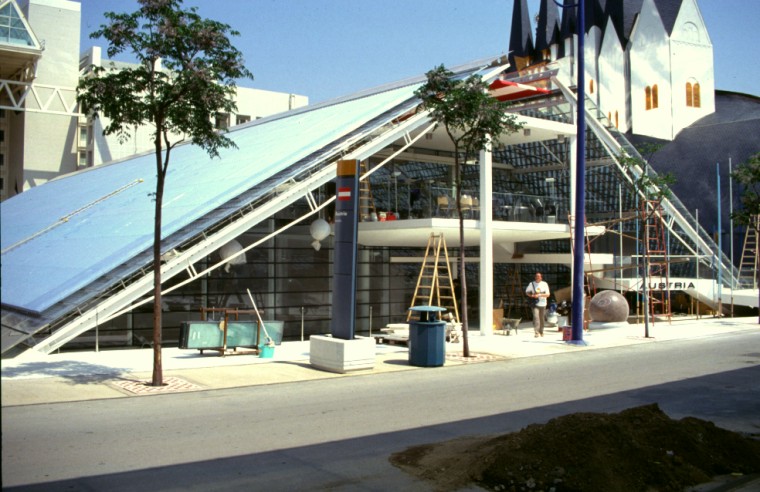 During the time in which computers became popular, Austria introduced itself with electroacoustic music at the world exhibition in Seville. Gottfried Martin, Dieter Kaufmann and Günther Rabl were invited to compose computer music and perform their arrangements in Seville.
During the time in which computers became popular, Austria introduced itself with electroacoustic music at the world exhibition in Seville. Gottfried Martin, Dieter Kaufmann and Günther Rabl were invited to compose computer music and perform their arrangements in Seville.
The Austrian Pavilion was equipped with 24 speakers in the pattern of a checkerboard playing Rabl’s pieces 'Farewell Tempered Piano' and 'Odysee'[Odyssey]. The grey spherical speakers were especially designed for the word exhibition and are still a faithful companion to Günther Rabl.
image description: Austria Pavillon at Expo '92 (Sevilla)
source: http://much.iicm.tugraz.at
Unfortunately the installation was disrupted by outside noise, air-conditioning, a skiing simulation and other attractions. As a result the pieces could not be enjoyed undisturbedly and at full volume. At times the music was toned down or off, because the workers at the pavilion at this six month exhibition felt disturbed by the experimental sounding music.
The 'Offenes Kulturhaus Linz' [open house of culture Linz] gave the installation a second chance replaying the installation under the name 'Austrian Soundscape'. In five different spaces the music was the main attraction being supported by different light effects.
*) Master Courses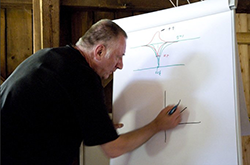
Since 2010, as chairman of the 'Electric Orpheus Academy', Günther Rabl organizes master courses at a former saw mill in the Waldviertel, where he mainly teaches with his self-programmed music notation programme 'AMP' and 'VASP'.
Under the technical supervision of his friend Wolfgang Musil the one-week course ends with a final concert of all the participants and a performance of artists such as Limpe Fuchs, Chieko Mori, Oliver Grimm and Michael Moser.
